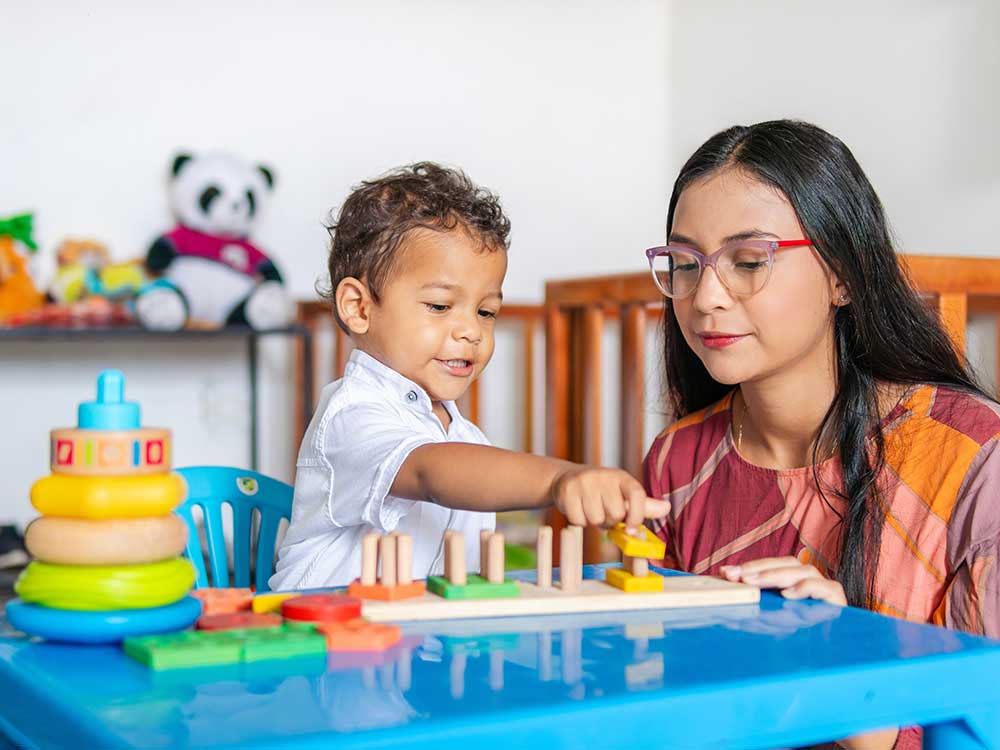Early childhood is often a promising, challenging time for young children, parents and caregivers. Wheeler’s Early Childhood programs, serving children birth to five, help families to navigate this chapter by providing tools and interventions that foster child learning, growth, and development. Offered with support from state and federal funders, these programs address behavioral health and developmental issues in young children and provide family-strengthening tools for parents and caregivers to help young children thrive.
According to Melissa Mendez, LCSW, senior director, Community, Crisis, Prevention, Wheeler’s programs are flexible and delivered to address gaps in care. “Sometimes, families need intensive levels of support through our largest programs such as Child First or HealthySteps. Other times, they may need limited consultation. Whatever the need, we’re here to help young children thrive at every stage, from pre-natal stage up to age five,” said Mendez.
Child First™
Child First™ is a direct service, home-based program funded by the Connecticut Department of Children and Families and the Connecticut Office of Early Childhood. The program helps caregivers and families to address emotional, behavioral or developmental challenges, as well as learning problems in young children, from prenatal stages to five years old. This program includes a comprehensive assessment of child and family needs; observation and consultation in early care and education; caregiver-child mental health intervention; development of a child and family plan of care; and care coordination and case management. Interventions are designed to support caregivers in their role as loving protectors and promoters of healthy development of the child. There are five Child First teams in DCF Region 6 New Britain/Meriden, and 120 families are served per year.
Healthy Steps
Wheeler’s HealthySteps, a national, evidence-based program of ZERO TO THREE, helps to strengthen parent-child bonds through screening, referral, and treatment to meet the mental health and primary care needs of its youngest patients. The program serves children birth through five years old who receive pediatric services at Wheeler’s Family Health & Wellness Centers.
Launched in 2019, HealthySteps promotes positive parenting and healthy development for babies and toddlers, with an emphasis on serving families living in low-income communities. Three early childhood specialists serve all of Wheeler’s community health centers, performing screening, assessment, referral, and linkage to services. Nearly 350-500 children are served annually.
Additional Wheeler Early Childhood programs include:
- Early Child Consultation Partnership®, an evidence-based early childhood mental health consultation program designed to meet the social and emotional needs of children, birth to five, by offering support, education and consultation to daycare, pre-school and other educational settings that serve young children, as well as to their parents and other caregivers.
- Family-Based Recovery (FBR) an evidence-based, intensive, in-home treatment program designed to support families with young children where a parent is struggling with substance use.
- Autism Spectrum Evaluation and Assessment, serves children, ages 3 and older, and includes multidisciplinary autism spectrum diagnostic evaluation and assessment services. This program is offered at 91 Northwest Drive, Plainville, for Medicaid-enrolled families.
- Learning Enhancement Attachment-based Pre-School Program (LEAP), a trauma-informed therapeutic pre-school classroom for children between the ages of 2.9 and 5 years who live in New Britain. LEAP is a collaboration between Wheeler and the YWCA of New Britain and is located at the YWCA’s facility.
- Parent Connections, a no-cost, in-home service that provides information, support and guidance to families with young children, ages birth to 5, who have concerns about their young child’s progress, growth, and development.
- Parent-Child Interaction Therapy (PCIT), a therapeutic family program for caregivers and children ages 2-7 that can be provided either in the clinic setting or in the family’s home.
Mendez said the common threads running through all of these programs are efforts to engage families as strong partners in their child’s lives and development.
“It’s perfectly ok for parents and caregivers not to know something, but the most successful families are the ones who reach out and admit they need help,” she said. “That’s where we come in, and that’s where we work with children and families through strategies that promote real-life interaction that will help babies and children thrive and grow.”
